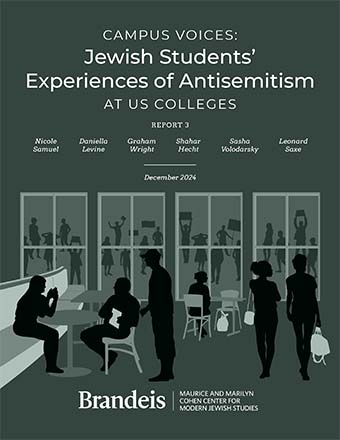Campus Voices: Jewish Students' Experiences of Antisemitism at US Colleges
Nicole Samuel, Daniella Levine, Graham Wright, Shahar Hecht, Sasha Volodarsky, and Leonard Saxe
December 2024
This report explores how October 7, the Israel-Hamas war, and the hostile climate on campus affected the day-to-day lives of Jewish students. Drawing from survey and long-form interview data collected during the 2023-24 academic year, the report describes how the hostility experienced by Jewish students affected their social relationships, academic studies, and sense of belonging on campus. Also addressed are the efforts by Hillel and Chabad professionals to support Jewish students, as well as to work with university administrators and concerned parents. The report is the fourth in our series of studies designed to aid efforts to address campus antisemitism in the wake of October 7. 
Key Findings
- Nearly two thirds of Jewish students rated issues related to antisemitism, Israel, and the Israel-Hamas war as the most pressing issues on their campus.
- Few Jewish students experienced concrete threats to their physical safety, but concerns about safety were still common, leading many Jewish students to avoid conversations about Israel or hide their Jewish identity.
- The Israel-Hamas war and the climate on campus had an especially profound impact on Jewish students’ social relationships, destroying friendships and widening divisions between Jewish and non-Jewish students.
- Stress and anxiety related to the war and antisemitism also affected some Jewish students’ academic pursuits.
- Jewish students and Jewish campus professionals felt that university administrators were often ineffective in their responses to the events of October 7 and Jewish students’ concerns about antisemitism.
- Campus Jewish organizations provided a refuge during a time of intense grief, but were sometimes the source of conflict and alienation for Jewish students with more nuanced or critical views of Israel.
Takeaways
Anti-Israel hostility isolates Jewish students from the campus community and drives perceptions of antisemitism.
Hostility to Israel had a major impact on the day-to-day lives of many Jewish students. This hostility was rarely expressed using explicitly anti-Jewish language but contributed to Jewish students’ concerns about antisemitism on campus. This was particularly true when hostility was targeted at Jews based on their Jewish identity or used language about Israel that the vast majority of Jewish students find antisemitic (e.g., “From the river to the sea…”).
Well-intentioned actions to support Jewish students can sometimes have negative consequences.
University administrators were frequently criticized for failure to act quickly and decisively after October 7. Many Jewish students also felt that some actions taken to reduce anti-Jewish or anti-Israel hostility further exacerbated campus tensions around the Israel-Hamas war. Off-campus Jewish advocacy organizations that criticized university administrations, made statements about campus safety, and organized speaker events and counter-protests, were seen by Jewish students and campus professionals as increasing the level of tension for Jewish students.
For campus professionals, making Jewish life welcoming for Jewish students with diverse views about Israel requires a challenging and delicate balancing act.
Jewish campus organizations were a refuge for students who felt alienated by the intense anti-Israel hostility pervading their campuses. But some Jewish students perceived campus Jewish organizations as politicized and unwelcoming of their views and opinions regarding the Israel-Hamas war and the Israeli-Palestinian conflict in general. For campus professionals, making Jewish life welcoming for Jewish students with diverse views about Israel, while also balancing the demands of other stakeholders (e.g. university partners, parents, alumni), is a complex challenge that demands further attention and support.